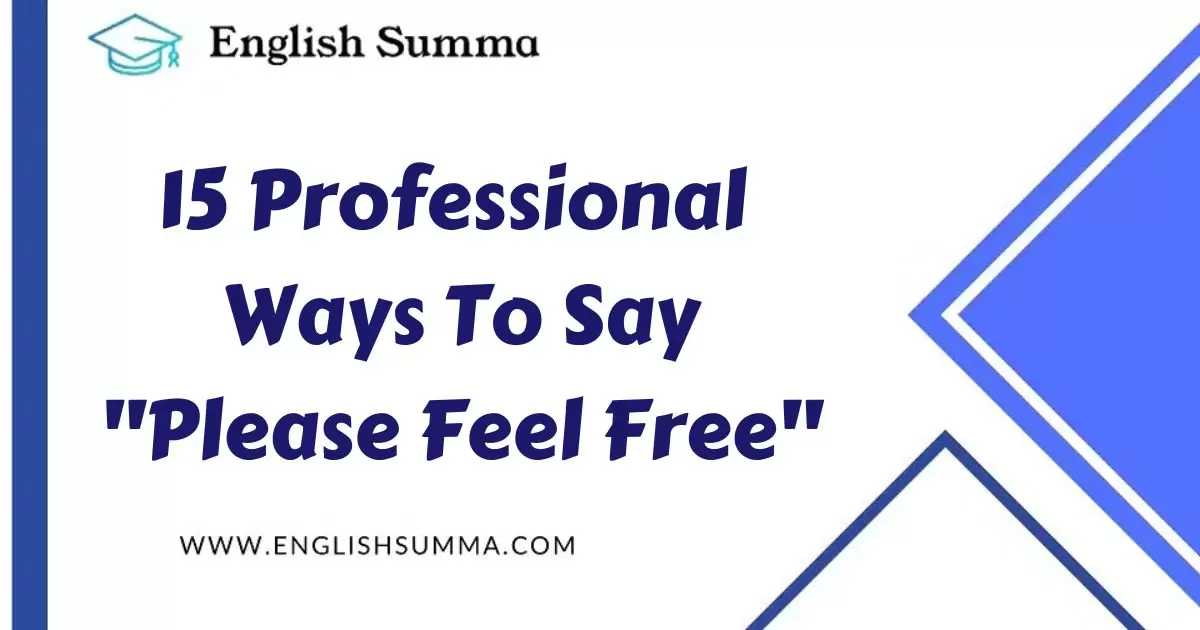When writing business emails or other formal communication, it’s important to maintain a professional tone while still being clear, friendly, and encouraging. The phrase “please feel free” is commonly used to politely prompt or invite someone to take some kind of action. However, there are many more professional alternatives that can communicate the same sentiment in a sophisticated way.
Can you use “Please Feel Free” in Professional Communication?
It is generally professional to say “please feel free” in certain contexts, but the phrase risks coming across as awkward or passive compared to more direct alternatives.
Stating what someone can do clearly and concisely often sounds more confident and welcoming.
For example, “Feel free to…” or “You’re welcome to…” open the door without ambiguity. However, the exact language that is most professional depends greatly on the situation and relationship between parties.
With the proper context and tone, “please feel free” can be welcoming without being unprofessional, but in many cases there are better options to clearly convey the same sentiment.
Professional Ways To Say “Please Feel Free”
- By All Means
- I Encourage You To
- Please Do Not Hesitate To
- You Are Welcome To
- I Welcome You To
- Please Know That You Can
- Do Not Feel Obliged
- Should You Wish To
- At Your Discretion
- Use Your Best Judgment
- Act as You See Fit
- Use Your Discretion
- You Have Full Authority
- The Decision Is Yours
- I Leave It To You
1. “By All Means”
“By all means” is a courteous phrase that essentially gives someone full permission to do something. It sounds more formal and thoughtful than simply saying “feel free.”
Email example: “By all means, go ahead and submit your proposal whenever you’re ready, John.”
2. “I Encourage You To”
Rather than just open-endedly telling someone to feel free, you can sound more professional by encouraging them directly.
Email example: “I encourage you to take the rest of the day off if you need to, Sarah.”
Learn 15 Ways to Say “This Is to Inform You”
3. “Please Do Not Hesitate To”
This phrase warmly urges someone to take initiative while also implying that you are fully supportive of them doing so. It is more formal than “feel free.”
Email example: “Please do not hesitate to reach out if any issues with the project come up, Amanda.”
4. “You Are Welcome To”
Saying “you are welcome to” makes it clear up front that someone has permission to do something, while retaining formality.
Email example: “You are welcome to use any of the resource documents I sent over, James.”
5. “I Welcome You To”
Very similar to “you are welcome to,” starting the sentence with “I welcome you to” puts a subtle emphasis on the fact that you are actively welcoming their action.
Email example: “I welcome you to schedule meetings with any experts mentioned in the report, Jennifer.”
6. “Please Know That You Can”
The phrase “please know that you can” conveys essentially the same message as “feel free,” but with a more professional tone.
Email example: “Please know that you can submit expense reports whenever is most convenient for you, Michael.”
7. “Do Not Feel Obliged”
When you want to make it clear that no obligation exists without directly saying “feel free,” go with “do not feel obliged.”
Email example: “Do not feel obliged to respond to the cold sales inquiry, Karen.”
8. “Should You Wish To”
Using this formal phrase instead of “feel free” implies that the choice is theirs while still being polite and professional.
Email example: “Should you wish to reschedule this week’s planning session, please let me know, Phil.”
9. “At Your Discretion”
Notifying someone that something is “at their discretion” makes it clear they can decide or act on their own terms.
Email example: “At your discretion, you can offer them a 5% discount on their next purchase order, Lisa.”
10. “Use Your Best Judgment”
For matters requiring decision-making, this phrase professionally conveys that you trust their judgment while giving them the flexibility to decide.
Email example: “Use your best judgment on prioritizing these new client requests, Eric.”
11. “Act as You See Fit”
This formal phrase indicates full confidence in someone’s capability and judgment to handle matters independently.
Email example: “Act as you see fit in responding to the customer’s special request, Nancy.”
12. “Use Your Discretion”
While similar to “at your discretion”, noting that discretion specifically can be used implies judicious wisdom in decision making.
Email example: “Use your discretion on whether sending a follow-up email would be beneficial or excessive, Tom.”
13. “You Have Full Authority”
Explicitly stating “you have full authority” makes it clear someone has complete sanction and backing to make autonomous choices.
Email example: “You have full authority to negotiate pricing with vendors within 10% of our budget ceiling, Monica.”
14. “The Decision Is Yours”
Simply noting “the decision is yours” politely indicates that a matter is fully open for someone else to decide without imposing any expectations.
Email example: “The decision is yours on the best way to allocate the yearly budget surplus between divisions, Carlos.”
15. “I Leave It To You”
Saying “I leave it to you” shows you fully trust someone else’s capability to independently handle a matter as they deem fit.
Email example: “I’ll leave it to you to judge whether Johnson & Associates are the best fit for our branding needs, Jessica.”
As you can see, there are many nuanced professional alternatives that can be used instead of casually saying “please feel free” in business or formal writing. By incorporating some of these more sophisticated phrases, you can maintain professionalism while clearly encouraging the recipient to feel comfortable moving forward.
The key is matching the tone and formality level to the situation and recipient. What language resonates best will depend on the email example or context. But keeping these professional options in mind will help elevate your writing.
Key Takeaways:
- Avoid overusing “please feel free” in formal communication
- Use thoughtful alternatives like “by all means” or “at your discretion”
- Directly encourage the person while retaining formality
- Give permission politely with phrases like “you are welcome to”
- Keep tone professional, but still clear and friendly
Using these tips will help you master professional ways to encourage someone while preserving sophistication. With the right formal yet inviting phrase, you can prompt others to take action without sacrificing courteousness. Think through what tone and language fit best, and incorporate some of these alternatives in your own business emails.

Meet Steven Smith, the driving force behind “English Summa.” Armed with a Bachelor’s Degree in Linguistics and a passion for teaching, Steven is dedicated to unraveling language intricacies for eager minds. Join him on a journey of linguistic discovery through Language Odyssey—a space where education meets inspiration, and the beauty of language unfolds.

